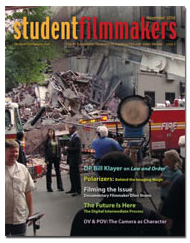Check out this
article in the print edition of StudentFilmmakers
Magazine, November 2006. More behind-the-scenes photos
in the print version. Click
here to get a copy and to subscribe >>
 Ben
Wu Discusses Shooting Docs On DV Ben
Wu Discusses Shooting Docs On DV
Cross Your Eyes Keep Them Wide
...Continued
from Previous Page
Could you talk a little more about the lighting?
Ben Wu: This was shot almost completely with
available natural light. But film can be pretty forgiving in terms
of exposure, so I�m not sure if I really would have needed more
light if I shot film.
The one segment I did light was a sequence of the artists� finished
artwork on a white background. I used a small room they had at
the studio they used for photography, and set up a couple small
lights. It took some tweaking, especially because I wanted good
exposure on the artwork, but the background would tend to blow
out and be too bright. I had to fix it in post, work on the color
correction a bit. In hindsight I would have liked more time with
that, and shaped the light a bit better to have it really pop
on the art and fall off of the background, but I think it turned
out fine given the circumstances.
Could you share a tip or technique, in regards to shooting
on DV, and in relation to your short documentary, Cross Your Eyes?
Ben Wu: Using a field monitor was key. I wanted
the film to almost seem that it was the course of a single day,
not specifically, but just to have that feel of the day starting
and the artists arriving, then capturing what happens over the
course of the day, and then the day ends. But since I shot over
the course of several weeks, the lighting would sometimes be totally
different from day to day. So in attempting to match the footage,
it was really helpful to have the monitor there, playback footage
from the previous day, and do our best to set it up as close as
possible.
The other is using a tripod. To me this was one of the most important
aspects of the style of the film. A quick cutting, hand held style
definitely has its place, but would have seemed really out of
place I think in this film. I really wanted the scenes to unfold
at their own pace. I wanted to have a �patient� camera, without
a lot of quick moves, pans and tilts. I was trying to go in the
opposite direction of a MTV quick cuts and camera moves style,
and more in line with narrative films like Ozu, or Jarmusch, with
long takes, letting the action unfold within a single composition.
I really tried to stay away from zooming in and out within the
shot, and even in editing, I didn�t use any dissolves. I wanted
it to be restrained in bells and whistles that would draw attention
to the style of the filmmaking, rather than the content. And shooting
on sticks, keeping the camera steady and subtle, was integral
to achieving that.
How long did it take to shoot, Cross Your Eyes?
Ben Wu: Over the course of about 6 weeks, I came
in on average probably 3 days a week. I shot about 25 hours all
together. It was a high ratio, but that was the kind of film it
was. I�d shot a couple tapes where there�s not much happening,
then all of a sudden on the fourth tape things would pick up,
and amazing interactions between the artists would occur, or an
artist that didn�t want to talk over the past couple weeks would
look up and say something stunning or hilarious. The same went
for spreading it out over a month and a half. I�d meet an artist,
and maybe initially they didn�t want to be involved. But over
the course of the weeks, they�d see how I was working, and be
comfortable with what I was doing, and then in week 5 agree to
be filmed. It was really nice to work in that kind of extended
framework.
How was the film edited, and how long did it take to edit?
Ben Wu: The film took about 3 months to edit.
In our program, during the 2nd and final year, we spend the fall
quarter of the year developing ideas and doing pre-production,
the winter quarter shooting, and the spring quarter editing. It
was done using Final Cut Pro, and I split my time editing at home
on my G5, and editing in my editing suite at school. It was nice
to go back and forth. I found a change of scenery every now and
then which really helped. It was great using external drives too,
because I could take my laptop and go out and show rough cuts
to friends and other filmmakers.
Did any challenges come up during editing?
Ben Wu: Conceptually huge changes were made along
the way. It�s a bit tricky making a film that doesn�t really have
a natural climax. A lot of the time you�ll see successful documentaries
that have these built in structures, often in some sort of contest�sports
docs leading up to the big game, spelling bees, dance performances.
It can be a lot more difficult trying to keep something moving
a long and interesting when you don�t have that. So I spent much
of my time rearranging sequences and trying to fit everything
together that would make sense and never bog down. What helped
for me was getting people whose opinions I respect to take a look,
and have small screening sessions with classmates. That was incredibly
helpful in coming up with creative and thoughtful solutions to
issues of structure.
Continued
on Next Page...
|
